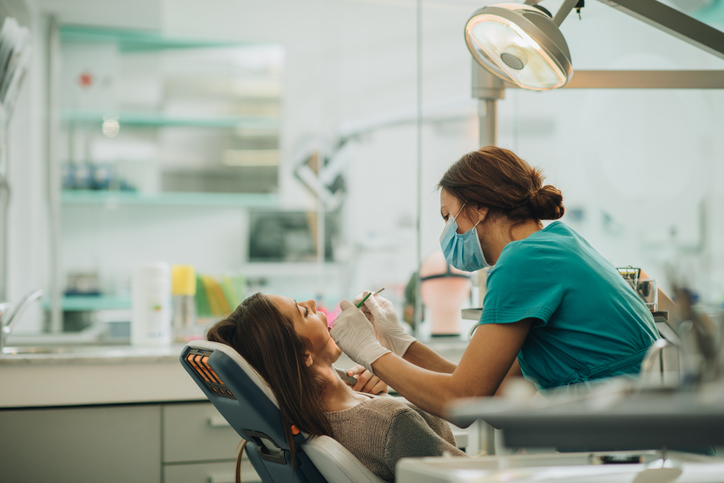The Advantages of Routine Checkups to a Dentist Eugene Oregon
The Advantages of Routine Checkups to a Dentist Eugene Oregon
Blog Article
Discover Frequent Oral Problems Your Dental Professional Can Resolve
Understanding regular dental problems is vital for preserving optimal dental health. Problems such as dental caries, gum condition, tooth level of sensitivity, negative breath, and tooth decay are typical yet typically forgotten until they become extreme. Regular oral brows through and personalized care plans can attend to these problems successfully, making sure a much healthier and brighter smile.
Tooth Cavities
Dental caries, additionally called dental caries, are a widespread dental health and wellness concern created by the demineralization of tooth enamel because of acid production from microbial plaque. This process starts when microorganisms in the mouth metabolize sugars and starches from food, generating acids that erode the enamel. Otherwise attended to without delay, this erosion can permeate much deeper into the tooth, impacting the dentin and ultimately the pulp, possibly leading to extreme pain and infection.
The beginning of tooth cavity development often present as white areas on the tooth surface, indicating preliminary demineralization. As the procedure proceeds, these spots can create into black or brownish sores, representing much more considerable decay. Routine oral exams are crucial for early detection, as dental caries in their incipient phases can be treated with remineralization techniques, such as fluoride treatments.
When a dental caries has actually formed, restorative treatment is needed. Dental practitioners normally get rid of the decayed part of the tooth and fill up the tooth cavity with materials such as composite material, amalgam, or ceramic. In a lot more severe situations, a crown or origin canal therapy may be needed. Precautionary measures, consisting of good dental hygiene techniques and dietary alterations, play a critical duty in reducing the threat of tooth cavities.
Gum Tissue Disease
While dental caries stand for a considerable issue for dental wellness, another crucial concern that demands focus is gum condition. Understood as gum disease, gum illness is an inflammatory problem influencing the cells surrounding and supporting the teeth. It is largely triggered by the buildup of plaque-- a sticky movie of bacteria that bases on teeth.
Periodontal illness progresses via stages, starting with gingivitis, identified by soreness, swelling, and bleeding periodontals (dentists eugene). If left unattended, gingivitis can intensify to periodontitis, where the internal layer of the gum tissue and bone retreat from the teeth, developing pockets that become contaminated. Gradually, the contaminants generated by the germs break down the bone and connective tissue that hold teeth in position, possibly leading to missing teeth
Early detection and therapy are vital. Specialist oral cleansings and enhanced dental hygiene techniques, such as cleaning two times daily and flossing, can take care of gingivitis. For advanced stages, therapies may consist of scaling and origin planing, antibiotics, or perhaps medical treatments.
Normal dental check-ups play a pivotal function in protecting against and managing gum disease. Dental practitioners can determine very early indicators and advise appropriate treatments, making sure the upkeep of healthy gums and general oral health and wellness.
Tooth Sensitivity
Tooth sensitivity influences numerous people worldwide, offering an usual yet typically upsetting dental concern. This problem occurs when the enamel, the outermost protective layer of the teeth, is jeopardized, disclosing the underlying dentin. The dentin has microscopic tubules that lead straight to the dental pulp, where nerves stay. When exposed to stimulations such as warm, cold, pleasant, or acidic materials, these nerves are activated, triggering sharp discomfort or discomfort.
Numerous factors contribute to enamel erosion and subsequent tooth level of sensitivity, including aggressive brushing, acidic foods and drinks, periodontal economic crisis, and bruxism (teeth grinding) Additionally, dental treatments such as teeth whitening can momentarily increase level of sensitivity.
Foul-smelling Breath
One more widespread dental issue that impacts people' everyday lives is negative breath, clinically described bad breath. Halitosis commonly stems from poor oral hygiene, which enables food fragments to remain in the mouth, fostering bacterial development.

Referrals might involve boosting oral health techniques, such as routine cleaning and flossing, using anti-bacterial mouthwashes, remaining hydrated, and attending to any oral issues. Efficient management of halitosis not just enhances oral health and wellness however also considerably boosts high quality of life.
Dental Caries
:max_bytes(150000):strip_icc()/HowMuchDoesDentalWorkCostWithoutInsurance-46a157f20bd442cab4544b18577120ab.jpg)
Protecting against dental cavity includes a combination of good oral hygiene methods and normal dental check-ups. Cleaning teeth at least two times daily with fluoride toothpaste, flossing to get rid of plaque in between teeth, and restricting the consumption of sugary foods and beverages are important preventative procedures. Fluoride treatments, oral sealants, and professional cleanings supplied by a dental expert can likewise play a substantial function in strengthening enamel and protecting against decay.
When dental caries occurs, early intervention is vital. Dental practitioners can remove corroded tissue and restore the tooth with dental fillings made from products such as composite material, amalgam, or porcelain. In advanced situations, therapies like crowns, root canals, or extractions might be essential. By addressing dental cavity quickly, dentists help protect oral framework and feature, making certain long-term dental health.
Conclusion
Attending to usual oral issues such as cavities, gum tissue disease, tooth sensitivity, poor breath, and tooth decay is moved here essential for keeping optimum oral health and total health. Dental professionals possess the competence to identify and deal with these issues successfully, guaranteeing tailored care for each person. Regular preventive measures and dental check-ups are essential in determining and handling these concerns early, promoting a much healthier and more positive smile over a lifetime.

Tooth degeneration, additionally understood as oral decays, occurs when the enamel, the outermost layer of the tooth, is deteriorated by acids produced by microorganisms in the mouth. Cleaning teeth at the very least twice daily with fluoride toothpaste, flossing to remove plaque in between teeth, and limiting the consumption of sugary foods and beverages are essential precautionary actions.Resolving usual oral issues such as tooth cavities, gum tissue illness, tooth sensitivity, negative breath, and tooth degeneration is vital for keeping ideal oral wellness and total health.
Report this page